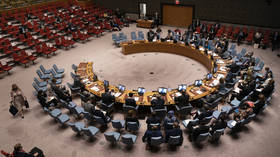Russia explains why it vetoed climate change resolution at UN

Russia has vetoed a draft UN Security Council (UNSC) resolution, linking climate change to security threats. Russia's ambassador to the body claimed the document would have set a dangerously one-sided approach to future conflicts.
The UNSC voted on the draft resolution, tabled by temporary members Ireland and Niger, on Monday. The proposal, co-sponsored by over 100 nations, called upon the UN secretary-general to make climate-related risks “a central component” of conflict prevention, while “incorporating information on the security implications of climate change” to make the council “pay due regard to any root causes of conflict or risk multipliers.”
While the draft was supported by the majority of UNSC members, it was vetoed by Russia, with another permanent member, China, abstaining. Among the temporary invitees, India was the only country to vote against the draft. Between them, the three countries are home to close to 40% of the world's population.
In this draft resolution we see an attempt of some states to gain leverage in the #UNSC to impose a particular vision with regard to fulfilment of climate commitments and ultimately to initiate putting any country on the SC’s agenda under the #climate pretext. @mfa_russiahttps://t.co/ctNmZQmmaC
— Russian Mission UN (@RussiaUN) December 13, 2021
Explaining the decision to sink the resolution, Russia’s Permanent Representative Vassily Nebenzia said the document would have imposed an extremely one-sided perspective to deal with conflicts, while potentially enabling the UNSC to put any country on its agenda under the guise of climate-related issues.
“We object to the creation of a new branch in the council’s work that asserts a generic and an automatic link between climate change and international security, turning a scientific and socio-economic issue into a political issue,” Nebenzia said during the meeting.
The proposed document was effectively “coercing the council to take a one-dimensional approach to conflicts and threats to international peace and security, i.e. through the climate lens,” Russia’s mission said in a separate statement.
We recognize the range of complex and intertwined challenges, including the impact of climate change, natural disasters, poverty, poor local governance that is mostly rooted in the colonial past, and terrorism threats that are an intolerable burden for some countries and regions. All those situations have their own specific characteristics.
The mission also noted that the draft was not actually as universally supported as its sponsors tried to present it, stating that the “penholders of the document were pushing it through without readiness to discuss the root causes of challenges” that the “vulnerable countries” are facing.
“As a responsible member of the United Nations and its Security Council, the Russian Federation along with India and China does not share such an approach imposed by the Western nations that have already made a significant number of countries expecting assistance believe in it,” the mission stressed.
Ireland has already voiced its displeasure over the demise of the draft resolution, with the country’s mission at the UN blasting the veto powers of permanent UNSC members as “an outdated tool, for what we think is an outdated perspective.”
“A historic opportunity to recognize climate change as contributing to conflict has been vetoed for now, but the consensus of international opinion is more than clear,” Ireland’s Foreign Minister Simon Coveney said.













